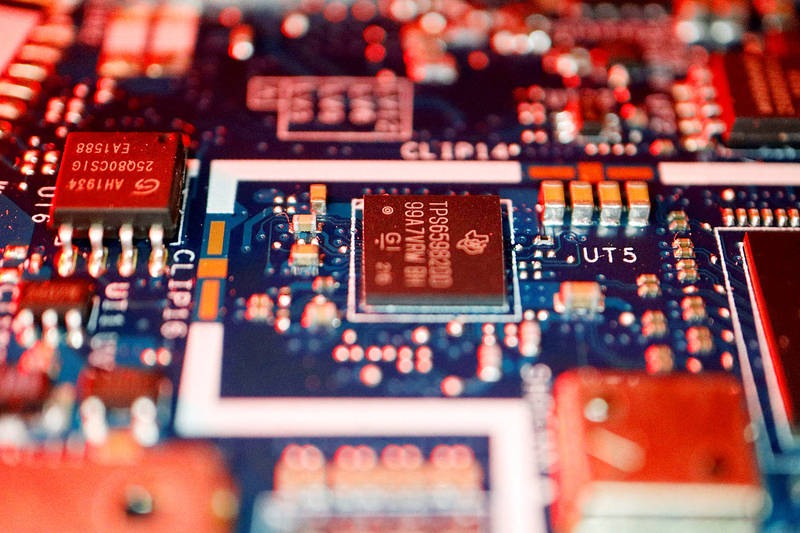《TAIPEI TIMES》US chip ban to hit China’s goals: study

Semiconductor chips are seen on a circuit board of a computer in this illustration picture taken February 25, 2022. Photo: REUTERS
IMPORT-DEPENDENT: US restrictions on the sales of semiconductor equipment to China could extinguish Beijing’s efforts to acquire advanced processes, a study said
By Chen Yu-fu and Jonathan Chin / Staff reporter, with staff writer
The US’ imposition of controls on chip exports to China might throttle Beijing’s plan to obtain breakthrough technologies in chip manufacturing, a study by the Taiwan Industry Economic Services said.
US President Joe Biden in August signed the Creating Helpful Incentives to Produce Semiconductors (CHIPS) and Science Act, which authorizes US$52.7 billion of subsidies for US chipmakers while banning the export of chips more advanced than 28 nanometers to China for 10 years.
It also imposes export controls on technologies linked to diamond and gallium oxide semiconductors, as well as software used in the design of complex circuits and gas turbines.
South Korea’s Samsung Electronics Co has been hit the hardest by the restrictions, as it has been trying to secure a foothold in the US while having a significant presence in China, the research institute wrote in a study commissioned by the Mainland Affairs Council.
Samsung Electronics has since 2012 invested US$25.8 billion in China, including on manufacturing facilities in Xian which account for 42.5 percent of its NAND flash memorychip manufacturing capacity, the institute said.
Should the US ban prevent Samsung from upgrading its Xian factory, the company’s competitiveness in the memorychip market would suffer a significant setback, it said.
This development would spell trouble for China’s plans to build semiconductor supply chains and limit the potential capacity of the country’s tech industry, it added.
Washington’s efforts to target the Chinese high-tech sector have intensified with the CHIPS Act, which suggests that the trade dispute between the two countries is not likely to abate son, the institute said.
The US-led blockade and regime of surveillance on technologies would profoundly impact the chipmaking sector in China, due to the industry’s dependency on imported products and technologies, it said.
Last year, China’s semiconductor imports surged 23.6 percent to a record US$432.6 billion, indicating that a local chip shortage had reached crisis proportions, the institute said, adding that the problem appears to be worsening.
Despite recent advances in the 7 nanometer process and NAND flash memory manufacturing, China would likely struggle in dealing with the ban due to the US’ control over lithography machines, electronic design automation and crucial chip technologies, it said.
This means continuing US action could snuff out China’s efforts to acquire advanced manufacturing processes and memory chips, it said.
China has also been grappling with a worsening shortage of electronics engineers. In 2020, 210,000 people graduated from electronics engineering departments or related fields, accounting for 2.3 percent of all college graduates, the study said.
Only 13.77 percent, or about 28,000 people, of electronics graduates found work as electronics engineers, it said.
This means China has 250,000 fewer electronic engineers than it needs, further limiting the country’s means of building a national semiconductor industry, it said.
Protectionist regulations being adopted in the US and other countries increasingly prevent China from leveraging foreign acquisitions as a shortcut to foster a domestic technology sector, the study said.
Due to US pressure, companies in the EU, Japan, Singapore and South Korea are discouraged from engaging in technical cooperation with China or outsourcing to that country, a factor that further disadvantages the development of the Chinese semiconductor industry, it said.
新聞來源:TAIPEI TIMES





















